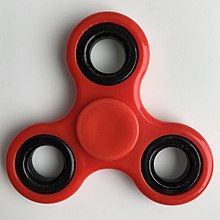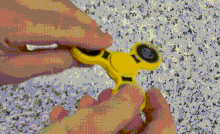
Summary
A fidget spinner is a toy that consists of a ball bearing in the center of a multi-lobed (typically three-lobed) flat structure made from metal or plastic with metal weights in the lobes, designed to spin around its central axis. Fidget spinners became very prevalent trending toys in 2017.
 A typical three-lobed fidget spinner | |
| Type | Stress-relieving toy |
|---|---|
| Availability | 1993–present |
| Materials | Brass, stainless steel, ceramic, titanium, copper, plastic, latex, etc. |

The toy has been promoted as helping people who have trouble focusing or those who may need to fidget to relieve nervous energy, anxiety, or psychological stress. There are claims that a fidget spinner can help calm down people who have anxiety or mental disorders, such as ADHD and autism,[1] though peer reviewed studies for this notion are lacking.[2][3][4]
A fidget spinner consists of a round, flat central bearing (usually a ball bearing) that allows the arms connected to it to rotate; around this central axis, there are usually three weighted arms, but their number varies depending on the model. When spun forcefully, they can continue spinning for up to several minutes, depending on the model.[5]
Development edit
In an interview appearing on May 4, 2017, on NPR, Scott McCoskery described how he created a metal spinning device called a "Torqbar"[6][7] around 2014 to satisfy with his own tendency to fidget in meetings and on conference calls while working in the information technology field in the Seattle, Washington, area of the United States.[8] He said he believed it was the first fidget spinner as they became known in their popular form.[6] In response to requests from an online community, he began selling the device online.[8]
Popularity and usage edit
With the rapid increase in the popularity of fidget spinners in 2017, many children and teenagers began using them in school, and some schools also reported that students were trading and selling the spinner toys.[9][10][11]
As a result of their frequent use by children at school, many school districts prohibited the toy.[12][13] Some teachers argued that the spinners distracted students from their schoolwork.[9] According to a survey conducted by Alexi Roy and published in May 2017, 32% of the largest 200 American public and private high schools had banned spinners on campus.[14]
When fidget spinners rose in popularity in 2017, many publications in the popular press discussed the marketing claims made about them for people with ADHD, autism, or anxiety.[4][12][13] However, there has not been research proving this notion.[3][4][15] They quickly fell in popularity and sales after peaking in May 2017.[16]
Invention and patent status edit
As of May 2017, the patent status of the various fidget spinners on the market was unclear.[17] Catherine Hettinger, a chemical engineer by training, was initially credited by some news stories as having been the inventor of the fidget spinner, including by media outlets such as Money,[18] The Guardian,[12] The New York Times,[13] and the New York Post.[19] Indeed, Hettinger had filed a patent application for a "spinning toy"[20] in May 1993 and a patent had been issued to her in January 1997 for the claimed invention.[17] Hettinger had allowed the patent to lapse in 2005 after she could not find a commercial partner to produce and market the toy.[17][12] Even if she had not allowed the patent to lapse in 2005, it would have expired in January 2014, before fidget spinners became popular.[20] Moreover, a May 2017 Bloomberg News article showed that Hettinger had not been the inventor of the fidget spinner since her toy did not have a similar central bearing that allowed it to be held and tilted while spinning, and Hettinger agreed.[17]
On May 11, 2016, McCoskery filed a provisional patent application for a (utility) patent on the invention of a version of the toy with a centrally mounted ball bearing and other particular features (with illustrations showing two- or three-lobed versions of the toy), and after following up with a final patent application in May 2017, he was granted a U.S. patent in March 2018.[6][21]
On November 29, 2016, David Allen Pavelsky of Killeen, Texas, applied for a design patent (not claiming an original functional invention) on a three-lobed version of the toy with a centrally mounted ball bearing and other particular features, and he was granted a design patent in October 2017.[22]
See also edit
References edit
- ^ McGri, David (2017-08-18). "Fidget Spinners". Huffington Post. Retrieved 2017-08-21.
- ^ Andersen, Rachel (9 March 2022). "Experts' Advice: Fidget Spinners Are Not for ADHD Treatment". Autism Parenting Magazine.
- ^ a b Calfas, Jennifer (May 11, 2017). "Do Fidget Spinners Really Help With ADHD? Nope, Experts Say". Money.com. Archived from the original on March 7, 2022. Retrieved May 16, 2017.
- ^ a b c Singh, Anita; Horton, Helena; Fuller, George (May 3, 2017). "Fidget spinners: the new classroom craze being banned across the nation". The Telegraph. Retrieved May 16, 2017.
- ^ Anne Demoulin, « Le Hand Spinner, la toupie qui fait tourner la tête des petits et grands », 20 minutes.fr, 11 mai 2017.
- ^ a b c Gonzalez, Guadalupe (June 8, 2017). "The Inside Story Behind the Rapid Rise of the Fidget Spinner Trend". Inc. Retrieved April 16, 2022.
- ^ "Millions sold: Was the original fidget spinner made in Suquamish?". The Seattle Times. May 17, 2017. Retrieved April 16, 2022.
- ^ a b Malone, Kenny (May 4, 2017). "Fidget Spinner Emerges As Must-Have Toy Of The Year". Planet Money. NPR. Retrieved May 18, 2017.
- ^ a b Calfas, Jennifer (May 4, 2017). "Here's Everything You Need To Know About Fidget Spinners". Money.com. Archived from the original on October 24, 2020. Retrieved May 6, 2017.
- ^ "Many Schools Ban Hot Toy For Being Distraction". CBS Los Angeles. May 4, 2017. Retrieved May 6, 2017.
- ^ "Fidget Spinners For Kids: Reports Say It's Distracting, Parents Say Not So". CBS Miami. May 2, 2017. Retrieved May 7, 2017.
- ^ a b c d Luscombe, Richard (May 5, 2017). "As fidget spinner craze goes global, its inventor struggles to make ends meet". The Guardian. Retrieved 11 May 2017.
- ^ a b c Williams, Alex (May 6, 2017). "How Fidget Spinners Became a Hula-Hoop for Generation Z". The New York Times. Archived from the original on 20 January 2023.
- ^ Roy, Alexi (May 10, 2017). "The Fidget Spinners Are Banned in 32% of the Largest High Schools U.S." Spinner List. Archived from the original on September 15, 2017. Retrieved June 5, 2017.
- ^ Bogost, Ian (May 12, 2017). "The Fidget Spinner Explains the World". The Atlantic. Retrieved 2017-07-09.
- ^ Fu, Lisa (June 14, 2017). "Get Over It. Fidget Spinner Trend Is Dead". Fortune. Retrieved September 1, 2020.
- ^ a b c d Brustein, Joshua (May 11, 2017). "How the Fidget Spinner Origin Story Spun Out of Control". Bloomberg News. Retrieved May 12, 2017.
- ^ Calfas, Jennifer (May 3, 2017). "Meet the Woman Who Invented Fidget Spinners, the Newest Toy Craze Sweeping America". Money. Archived from the original on April 16, 2021. Retrieved August 31, 2018.
- ^ Miller, Joshua Rhett (May 5, 2017). "Woman who invented fidget spinners isn't getting squat". New York Post.
- ^ a b US 5591062A, Catherine A. Hettinger, "Spinning toy", published 1997-01-07, issued 1997-01-07
- ^ US 9914063B1, Michael Scott McCoskery, "Toy designed to spin in a user's hand", issued 2018-03-13
- ^ US D801440S1, David Allen Pavelsky, "Triple ended spinner toy", issued 2017-10-31
External links edit
- Media related to Fidget spinners at Wikimedia Commons
- The dictionary definition of fidget spinner at Wiktionary


